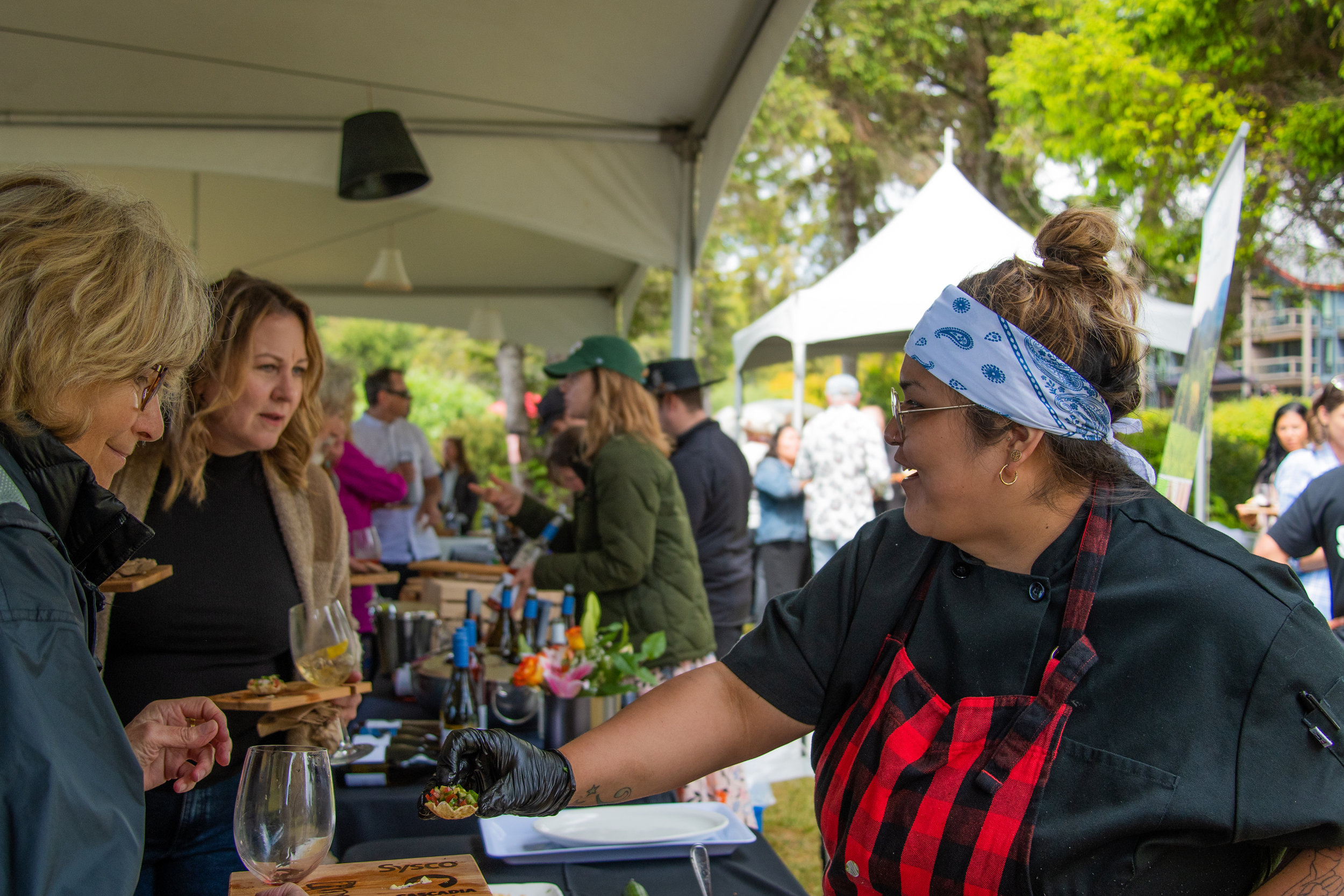Catering Rooted in Community, Heritage and Coast
Kayla Frank, the founder of Naana Ookmin Catering Co, started cooking the likes of Chicken Cordon Bleu for her brother at the ripe young age of 13. With her single mother juggling school and a couple of jobs, Kayla took the helm in the kitchen where, after watching the likes of Food Network, she felt called to learn to improve the meals she and her brother ate.
But it was at Tofino’s Best Western Hotel at the age of 15 that her life truly began its culinary trajectory. She credits Chef Margot Bouchon as the catalyst for her decision. “She instilled in me that I had the potential to learn and thrive in the industry,” Kayla shares. “I also liked the fast-paced environment and the teamwork aspects.” From there she worked in different kitchens in Tofino, including at SoBo under Chef Lisa Ahier, until she had enough hours for her Red Seal Chef’s exam.
Food, for Kayla, is a way to bring everyone together. “Everyone has to eat—it’s really beautiful to have the power to nourish people,” she says. “It’s a really wholesome experience to provide that service.”
Inspired by ancestry
A member of the Tla-O-Qui-Aht First Nations, Kayla started Naana Ookmin last year. The name means “Mother of the Feast Bowl,” and is a geographical location where Kayla’s ancestors lived, and she herself spends a lot of time during the summers. “I like the way it sounds, and the location means a lot to me—it’s surrounded by mountains, with crabapple, berries, medicine, seafood, otters, bears, deer…it was our home base three to four generations ago.”
On the inspiration for starting Naana Ookmin, Kayla shares: “I wanted to work independently, and I like being my own boss. But I also wanted to see more Aboriginal representation in the culinary industry here—I want to be another person in the community who can provide catering services in the Tla-O-Qui-Aht Territory.”
Somewhat unsurprisingly then, her food philosophy is rooted in heritage and place. Kayla cites her grandmother as a really big inspiration for her style of cooking: “Her happy place was in the kitchen. She was a baker and made bread almost every day that I knew her. I like to include some of her recipes, usually something like Bannock, Fry Bread, some sort of fish chowder or clams.” Then there’s her father, owner of Karemarena Fishing Co, who is a regular collaborator for Kayla’s ingredients—from prawns to salmon and halibut. “I mainly cook pescetarian—that’s my style, part of my heritage, all my ancestors survived off the ocean’s bounty. It’s the staple in Tofino, and what’s meant to be created here,” she shares. Overall, she tries to create by the 100-mile rule (sourcing ingredients within 100 miles)—cooking based on the season, and what’s locally available, with sustainability playing a key role.
Beyond her grandmother’s influences, Kayla’s menus are guided by the idea of bringing the comfort of homestyle meals to the people she’s cooking for. “A lot of the people are guests in Tofino—I want them to have the option to have something you would eat at home, but with an additional professional layer on top of that.” Her main clientele is visitors for retreats and workshops, alongside catering at the Naa'Waya'Sum Gardens facilities and the recently reimagined Cedar Coast Arts and Ecology Centre on Vargas Island.
Cedar Coast
Cedar Coast opened this year with a new visual identity and a reframing from a scientific field station to an emphasis on art. An interdisciplinary learning environment, it will play host to a diverse group of educators while also being available to rent, as a means to further support their school programs and summer camps. Despite its remoteness, food plays a vital role in the centre’s vision.
“The project as a whole is really about sustainability and regenerative systems,” shares founder Simon Nessman. “And it’s a chance for people to develop a more intimate connection with food and where it’s coming from. Our food gardens are a really core part of the overall project,” he explains. Run by Bridget Salas, they are currently “small, but productive, with lots of greens, carrots, a small orchard, a big herb garden.” Nessman notes, “We’re not self-sufficient at this point, but the vision for the future is getting us as close to that as possible and integrating it into the programs.”
For Kayla, it suits her food philosophy perfectly. When speaking about the garden, she says, “It won’t be ready until fall or next year, but my goal for the summer months is to only bring over what I need for baking and use the vegetables and edible flowers Bridget grows on-site. Get fish from my dad or from Lenny. I would take a lot of pride in cooking something that has little to zero footprint.”
Having started at the centre last year with a three-day stint as a relief chef, Kayla quickly found she clicked with the team and the location. “I loved the adventure of working off-grid. It’s a very different experience—you have to haul everything over or call it in by boat,” she explains. “It’s so nice to work in solitude over there—stay in a cabin; it’s so quiet. It doesn’t feel like work at all sometimes,” she says with a smile.






